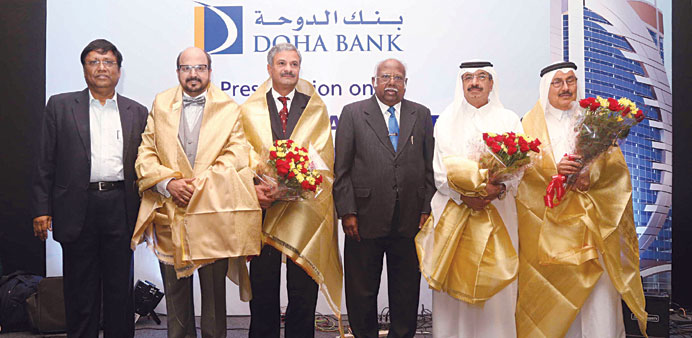Doha Bank chairman Sheikh Fahad bin Mohamed bin Jabor al-Thani, managing director Sheikh Abdul Rehman bin Mohamed bin Jabor al-Thani with Group CEO, Dr R Seetharaman among others at the knowledge sharing session at the Hotel ITC Grand Chola in Chennai on Friday.
A free trade agreement (FTA) between the GCC and India is expected to give a boost to bilateral trade, said Doha Bank Group CEO Dr R Seetharaman.
He was speaking at a knowledge sharing session on “Opportunities in Qatar and GCC” organised by Doha Bank in Chennai, India on Friday.
The event was held in the run-up to Doha Bank’s entry into the Indian financial market as it has received the licence to commence banking operations in India.
The event was attended among others by Doha Bank chairman Sheikh Fahad bin Mohamed bin Jabor al-Thani, managing director Sheikh Abdul Rehman bin Mohamed bin Jabor al-Thani; directors, Sheikh Abdulla Mohamed Jabor al-Thani and Ahmed Abdulla Ahmed al-Khal.
In February India had sought Saudi Arabia’s support for early conclusion of the free trade agreement with the GCC (Gulf Co-operation Council) countries, he said.
India plans to launch Saudi–India Business network (SIBN) to promote commerce and trade, investment, business-to-business interactions and exchanges between the two countries. Renewable energy is an area, which offers tremendous scope for Indian and Saudi companies to work together.
Last month Saudi Arabia and India formalised the structuring of the $750mn Saudi-Indian Investment Fund. India’s investment in the UAE is estimated at $52bn, excluding the companies based in the free zones in Dubai, Abu Dhabi and other emirates.
UAE ranks 10th among the top investing countries in India. The UAE’s investments in India are concentrated mainly in sectors such as power, metallurgical industries construction development, services sector, computer software and hardware.
India and the UAE are working towards a ‘bilateral investment promotion and protection agreement’ to enhance investments. Kuwaiti investments in India are in excess of $2.5bn. Kuwait wants Indian companies to bid for gas, railways, construct hospitals and schools and other infrastructure projects.
On current trends in the Indian banking sector, Seetharaman said, “In its recent monetary policy the RBI (Reserve Bank of India) had kept the policy repo rate unchanged at 8%. The RBI is firmly focused on keeping the economy on a disinflationary path that is intended to hit 8% CPI inflation by January 2015 and 6% by January 2016. Since January this year, the RBI has shifted focus to CPI from WPI bringing its approach closer to counterparts from Indonesia to Europe to the US. In 2012 India had ended with credit growth at 16.3% and deposit growth at 13.3%.
“Bank deposits grew by 15.9% annually in 2013, while credit growth clocked 14.5% in the same period. Credit growth will remain subdued in 2014 due to overall economic slowdown. Recently the RBI extended the timeline for full implementation of the Basel III capital regulations by a year to March, 2019.”
Seetharaman said projects worth more than $450bn are expected to be launched in the Gulf in 2014. Qatar, the UAE and Kuwait are expected to implement projects worth more than $70bn, $85bn and $70bn respectively in 2014.
The GCC is expected to attract $57bn into petrochemical industry over the next five years. The growing demand for healthcare services, coupled with regulatory changes and emphasis on quality healthcare, the GCC a huge potential investment destination for the Indian healthcare companies.
Qatar plans to spend more than $1bn in the next five years to build and equip hospitals and medical cities. Indian economy an ideal source for sourcing and developing agro-based value chain in the GCC region.
Indian investors in turn have huge opportunities for investment in knowledge and skill based services in GCC, particularly in fields such as IT.

